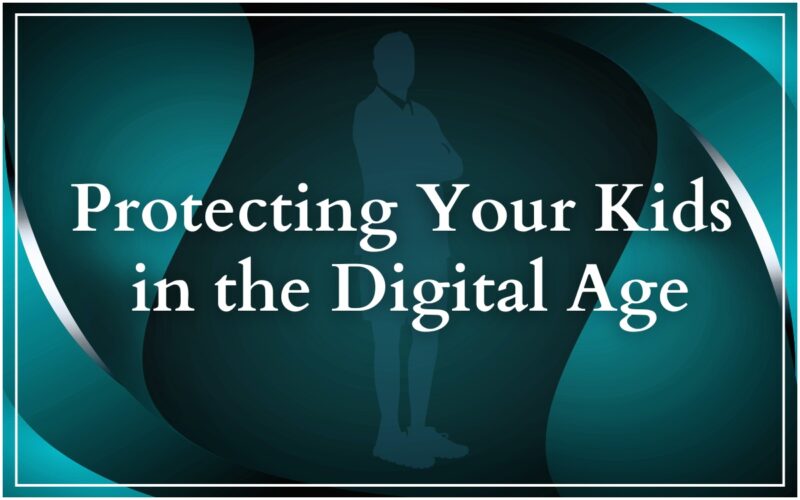As discerning fathers, we should worry about our impressionable kids’ internet use. Nefarious characters populate cyberspace, and inappropriate content is everywhere.
Your children are too young to fend for themselves in the digital age. Use these tips to protect your children from internet threats.
Be Upfront About Dangers
Discuss social media etiquette and the potential risks your kids may encounter online to help them keep their guard up.
You may touch on concepts and topics your children are too young to comprehend. Use simple language as much as possible. Speak with them at their level to ensure they understand what you want to say without confusing them with too many details.
Teaching them basic internet safety will inform them about both healthy and detrimental online behaviors, helping them develop beneficial habits and sense when something’s wrong. Discussing real dangers and their potential harm differs from employing scare tactics as you’re instilling practical knowledge rather than arousing fear to induce vigilance.
Set Ground Rules
Tell your kids what they can and can’t do with their electronics. Set schedules and screen time limits. List the appropriate apps they can use and the sites they can visit. Your rules must be firm and fair. However, they’re ineffective without apt consequences, so emphasize the penalties when they violate them.
Adopt a strict parenting style to promote internet safety
Children who are raised this way are less likely to misbehave. Although strict parenting may seem autocratic today, it promises the healthiest outcome for your kids. This style involves frequent communication to remind your children of the parameters of internet usage while giving them room to exercise independence. Allowing them to make decisions helps them grow into responsible, confident adults who self-regulate and manage unpleasant emotions well.
Being strict regarding internet use will make you unpopular with your kids. They may dislike your restrictions or think you’re not cool for being so paranoid, especially when their friends live in more permissive households. But don’t give in. Your kids are too young to realize the gravity of downloading a malware-infected file, having candid conversations about their private lives with strangers and sending seemingly benign selfies to mysteriously friendly grown-ups.
Be a responsible parent and put your foot down. Let them know you’re doing this to look out for them because you care about them deeply.
Create Your Children’s Accounts
Sign up on your kids’ behalf to decide which details to include, and manage their passwords. Doing so gives you unrestricted access to their inboxes, letting you know what they’re up to through email notifications and targeted ads.
Moreover, use your name or make one up to avoid revealing your children’s true identity. If an app or a site asks if you’re at least 18 years old, don’t register the account. Age restrictions exist to protect underage users, so respect them.
Ignoring these digital guardrails will endanger your children psychologically. For example, about a third of female teenagers have felt bad about their bodies because of Instagram. The Gram isn’t the only one causing anxiety and depression — Facebook has commonly been an avenue for cyberbullying while TikTok has encouraged users to commit vandalism and other antisocial behavior.
Even worse, Mark Zuckerberg and company don’t take their products’ negative impacts on the youth as seriously as they should.
As a parent, it would be naive of you to expect social media giants to rock the boat and behave more ethically when they financially benefit from the status quo. You must take control of the situation and use common sense to safeguard your children online until they’re old enough to protect themselves.
Designate Gadget Zones
Don’t allow your children to use the internet privately — no gadgets in bedrooms. Instead, place your computers and gaming consoles in common areas, like the family room or kitchen.
Children defer to adult authority — they’re less likely to misbehave and be defiant when you’re around. Gadget zones will make your children think twice about defying your wishes, no matter how arbitrary the ground rules may seem to them. The chances of getting caught red-handed are high when a grown-up can walk in at any time.
Use your gadget zones as an opportunity to make using the internet a family-bonding activity. Spend time online with your kids when browsing the web for homework, streaming media or playing games.
Maximize Parental Controls
Leverage blocking and filtering tools and parental controls to create a safe space for your children. They allow you to keep tabs on their digital footsteps. For example, you can set up content and privacy restrictions on smartphones and tablets.
The Children’s Online Privacy Protection Act gives parents control over what operators of commercial sites and online services collect from children under 13. The problem is even its enforcer — the Federal Trade Commission (FTC) — admits this legislation can’t stop minors from consuming inappropriate content like pornography.
Instead, the federal agency recommends seeking help from internet service providers (ISPs). They can restrict access to specific online materials, making it challenging for children to consume age-inappropriate content even if they try.
Safeguard Your Kids From Internet Threats
While the internet will always be dangerous, using it is inevitable. Our children will eventually have to navigate it, so do your best to guide them and they won’t have to learn their lesson the hard way.
Jack Shaw is the senior lifestyle writer at Modded with and a single father with a special interest in navigating the ins and outs of being a parent. As fathers, the work we put in isn’t always recognized, but it’s absolutely essential to the health and well-being of our children. You can find more of Jack’s work in publications like Tiny Buddha, Daddy’s Digest, Parent.com and more. Contact him via LinkedIn.









